Key takeaways:
- Sibling rivalry often arises from the competition for parental attention and can foster resilience and negotiation skills.
- Effective communication strategies, such as active listening and using “I” statements, help to reduce defensiveness and improve understanding among siblings.
- Establishing fair conflict resolution methods, like turn-taking in discussions, can create a more harmonious family environment.
- Engaging in cooperative activities and celebrating individual strengths boosts self-esteem and strengthens sibling bonds.
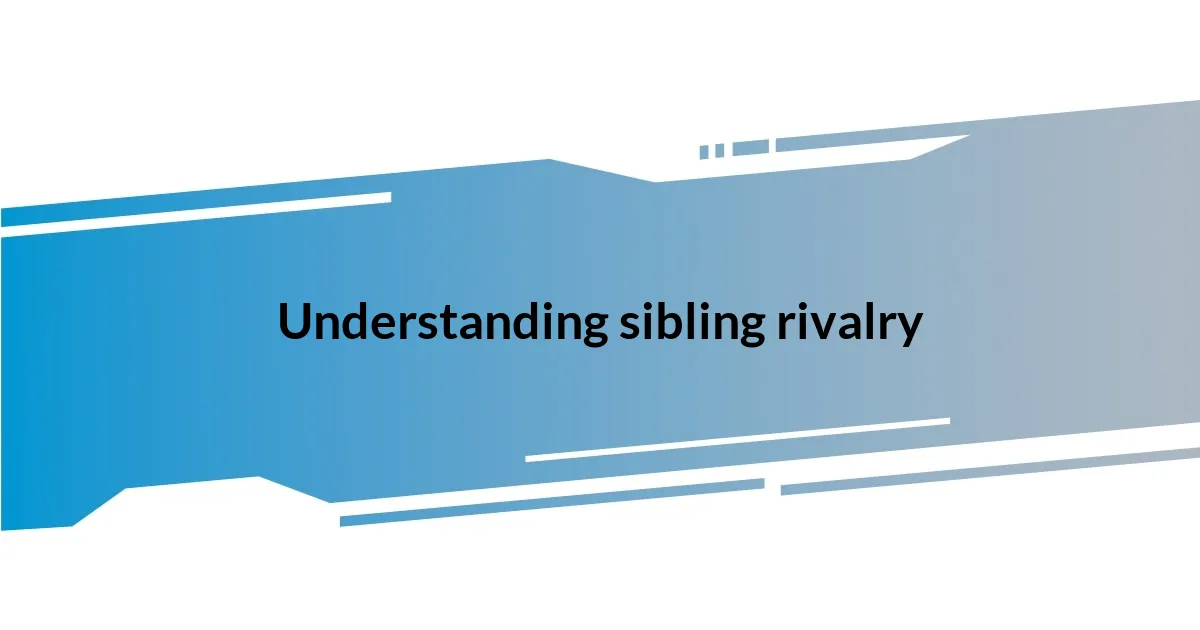
Understanding sibling rivalry
Sibling rivalry is a complex phenomenon, often rooted in the struggle for attention and affection from parents. I remember feeling that tug-of-war when my younger sister hit the scene; it was as if the love I once enjoyed was suddenly up for grabs. Isn’t it fascinating how something as innocent as sharing a family can sow the seeds of competition?
As I navigated those early years, I realized that sibling rivalry can also foster resilience and negotiation skills. For instance, my brother and I would frequently argue over whose turn it was to pick the movie for family night. Those small disagreements taught me how to voice my needs while also considering someone else’s wishes. Have you ever reflected on how those little skirmishes shaped your relationship?
It’s important to recognize that these rivalries often serve a developmental purpose. They can create an environment where siblings learn to assert themselves and communicate. I found myself pondering: does rivalry ever truly fade, or does it just transform into a different kind of bond as we grow older? My journey has shown me that, while the competition might simmer, the underlying connection can deepen, leading to stronger ties in adulthood.
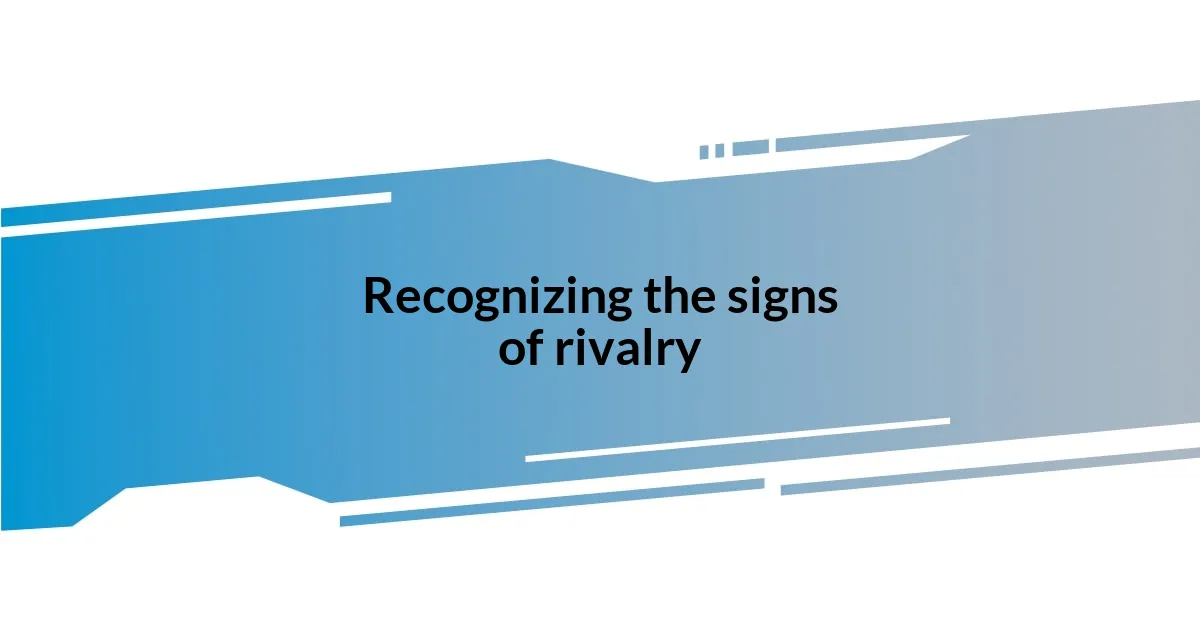
Recognizing the signs of rivalry
Recognizing the signs of rivalry can feel a bit like reading between the lines of daily family interactions. You might notice siblings engaging in constant comparisons, like who did better on a test or who has cooler friends. I distinctly remember my brother always boasting about his sports achievements, while I felt compelled to prove my worth through grades. Such behaviors often indicate a struggle for validation that can easily escalate if left unaddressed.
Another telltale sign is the way siblings react to each other’s successes. When my sister received recognition for her art, instead of applause, I felt an overwhelming mix of jealousy and disappointment. It was uncomfortable to admit, but this response highlighted how deeply entrenched our rivalry was. Keeping an eye on these reactions can help you understand underlying feelings and tensions simmering beneath the surface.
Ultimately, common physical expressions of rivalry, like glaring, pushing, or whispering negatively about one another, create a charged atmosphere at home. I recall instances when a seemingly innocent game of Monopoly turned into a battlefield, with chairs being shoved and hurtful comments flung across the table. These moments are critical indicators that rivalry may be turning toxic, requiring mindful intervention.
| Sign | Description |
|---|---|
| Comparison Games | Constantly comparing achievements, whether academically or socially. |
| Jealous Reactions | Negative responses to each other’s successes, often masking deeper insecurities. |
| Physical Conflict | Tangible expressions of rivalry, such as aggression during games or activities. |
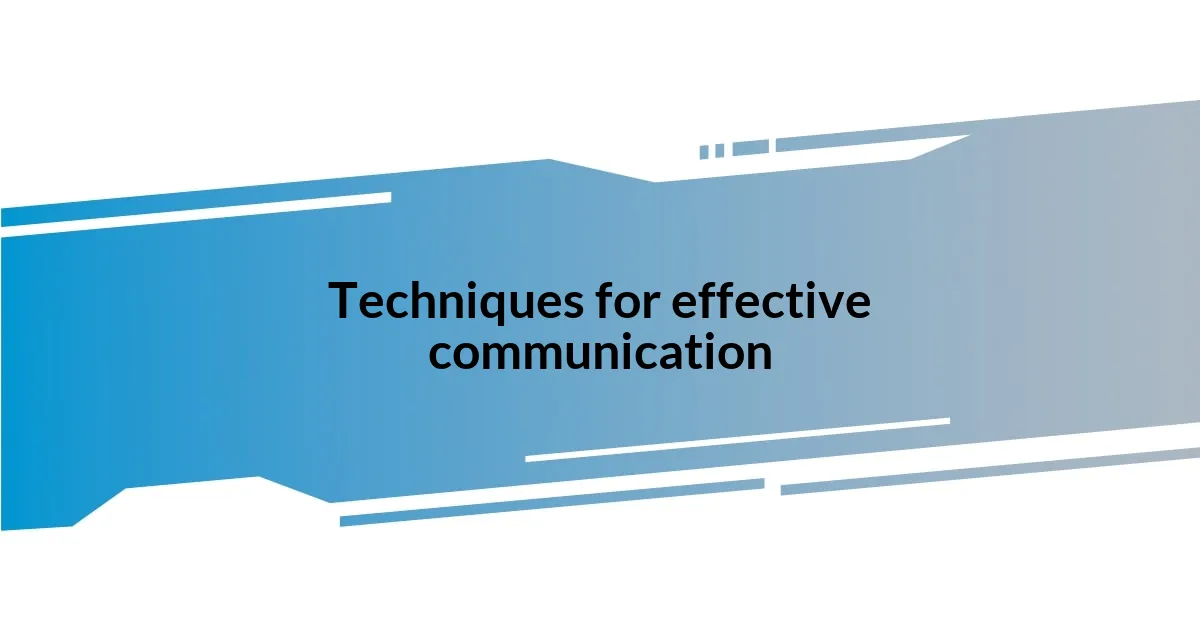
Techniques for effective communication
When it comes to sibling rivalry, effective communication can truly pave the way for better understanding and cooperation. I learned that taking the time to talk openly about my feelings made a world of difference. For instance, I once shared with my siblings how overwhelmed I felt when they kept bringing up my failure to make the team, and that vulnerability opened the door for them to express their own pressures as well. It’s in moments like these that genuine connections can flourish, leading to healthier interactions.
- Active Listening: Make an effort to really hear what your siblings are saying and validate their feelings. I remember a time when my sister felt unheard during a family conversation; acknowledging her feelings made her more willing to share what’s on her mind.
- Use “I” Statements: Instead of saying “You always…”, I shifted to “I feel…” which helped me express my emotions without sounding accusatory. This approach dramatically decreased defensiveness during discussions.
- Set Aside Quality Time: Scheduling time together for fun activities strengthened our bond and created a relaxed atmosphere for open dialogue. A simple movie night, just us, led to a heart-to-heart about our worries and frustrations.
Building on this idea, I discovered that empathy plays a crucial role in fostering understanding. I think of those tense moments when a disagreement would escalate; recognizing each other’s perspectives made it easier for us to find common ground. One evening, while arguing over whose turn it was to pick a family activity, we both realized we had competing desires for different types of fun. Acknowledging that our motivations stemmed from similar needs allowed us to negotiate a solution that satisfied us both.
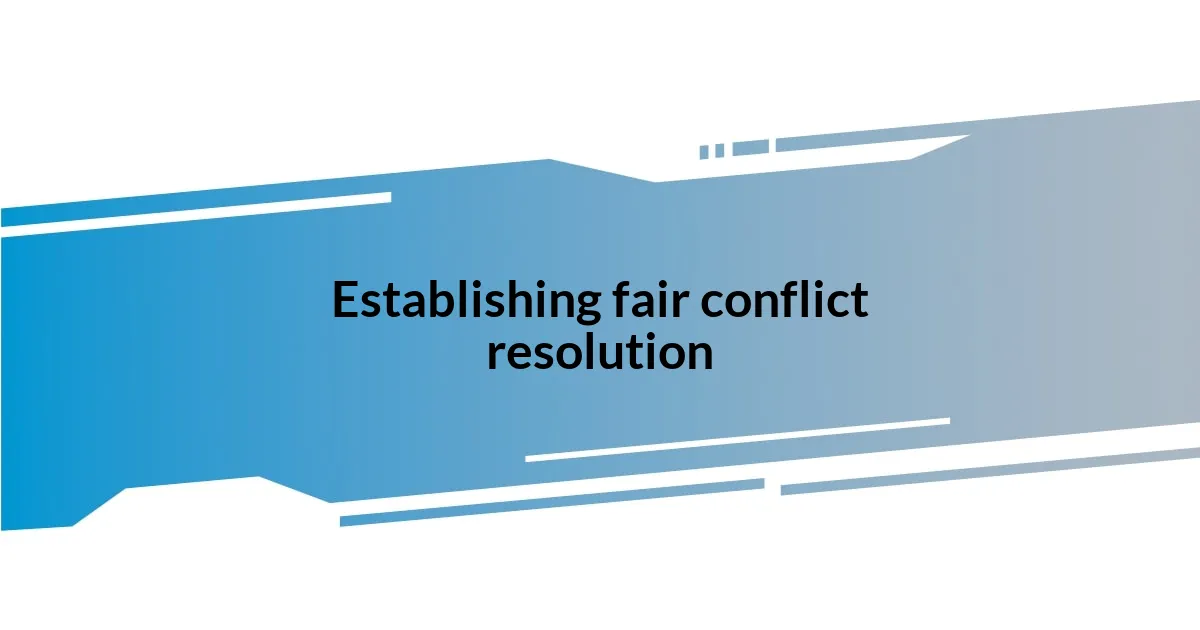
Establishing fair conflict resolution
Establishing fair conflict resolution among siblings means creating an environment where everyone feels heard and valued. I recall a pivotal moment when my siblings and I were at an impasse about who would get to choose our weekend plans. Instead of shouting over each other, we decided to sit down with a snack, and I proposed a way to take turns. That simple approach not only defused the tension but also helped us realize the power of compromise.
In my experience, setting clear ground rules makes a huge difference. For example, we agreed that when conflicts arose, each person would get a specific amount of time to express their feelings without interruption. I’ll never forget the first time we tried this method. I felt anxious and vulnerable sharing my feelings, but as I voiced my frustrations, my siblings listened attentively. This not only allowed for understanding but also fostered respect among us.
Sometimes, it’s the little rituals that reinforce fairness. I remember we used to have “family meeting nights” where we would address any simmering issues. The routine helped remind us that we valued harmony over being right. How often do we overlook the necessity for periodic check-ins? In those moments, I found that conflicts transformed into opportunities for growth, making our bond stronger rather than strained.
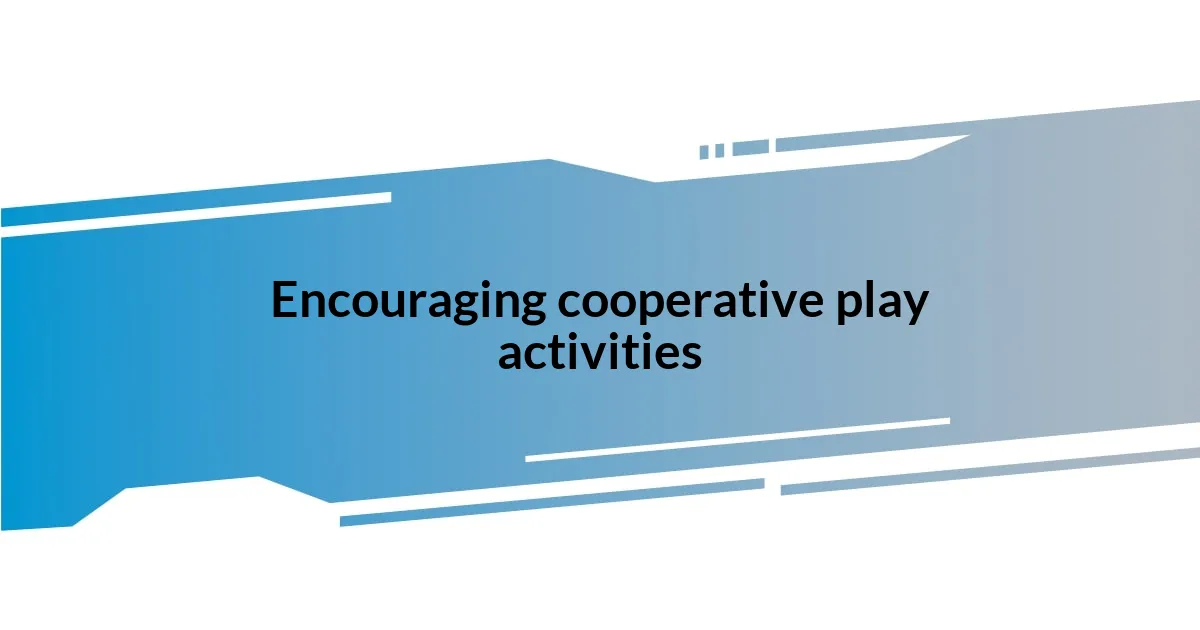
Encouraging cooperative play activities
Engaging in cooperative play activities changed the dynamic between my siblings and me significantly. I remember when we decided to build a fort together using cushions and blankets. It was incredible to witness how a simple project shifted our focus from bickering to collaborating. I can’t help but think—how often do we overlook the power of teamwork in turning rivalry into a shared experience?
Another effective approach was introducing games that required two or more players to work as a team. One of our favorites was a scavenger hunt, where we had to rely on each other to find clues and solve riddles. There were moments filled with laughter and frustration, but what stood out to me was the sense of accomplishment we shared after successfully completing it. It reinforced the idea that achieving a common goal, even amidst challenges, brought us closer together.
Lastly, I found that celebrating small victories while playing cooperatively really boosted our relationship. Whenever we completed a challenge or won a game together, we made it a point to recognize each other’s contributions. This acknowledgment built a foundation of trust and encouragement, making it easier for us to navigate our differences in the future. Have you ever noticed how celebrating together can create those lasting bonds? For us, it became a cherished way to strengthen our sibling relationship.
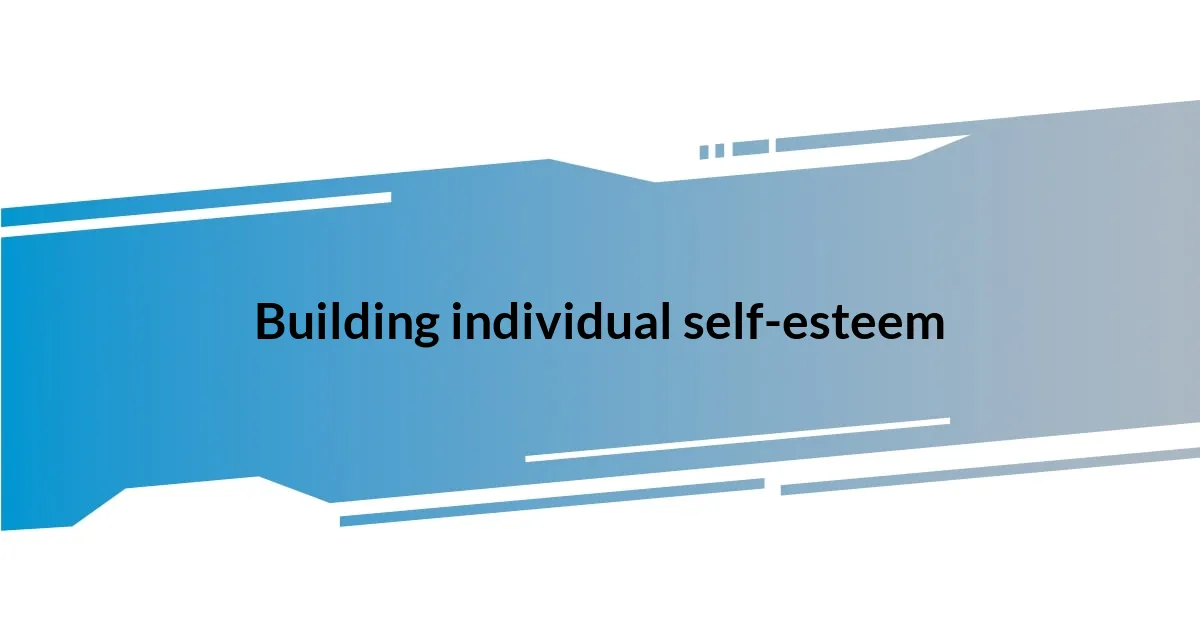
Building individual self-esteem
Building individual self-esteem within the context of sibling relationships is crucial. I vividly remember how, during family game nights, we each had a moment to shine—whether it was answering trivia questions or showcasing our winning moves. It felt uplifting to receive encouragement from one another, and it sparked a sense of pride in our individual achievements. How often do we underestimate the power of simply cheering each other on?
I also learned that validating each sibling’s unique interests solidified our self-worth. For instance, when my brother wanted to pursue painting while my sister loved sports, instead of comparing talents, we made a point to support each other’s passions. I can still recall those afternoons spent watching my brother showcase his artwork or cheering at my sister’s games. Those moments made me realize how empathy can nurture our self-esteem and create an environment where everyone feels they belong.
Creating rituals to highlight each person’s strengths was another game-changer. One of my favorites was our “praise circle,” where we sat in a circle and took turns sharing something we appreciated about each sibling. I remember feeling a rush of warmth and gratitude when it was my turn. The simple act of speaking and being heard not only reinforced our individual identities but made it clear that we all had a role to play in this family tapestry. How can we incorporate such meaningful moments into our lives? By recognizing and celebrating individuality, we can foster a deeper appreciation for each other in the process.
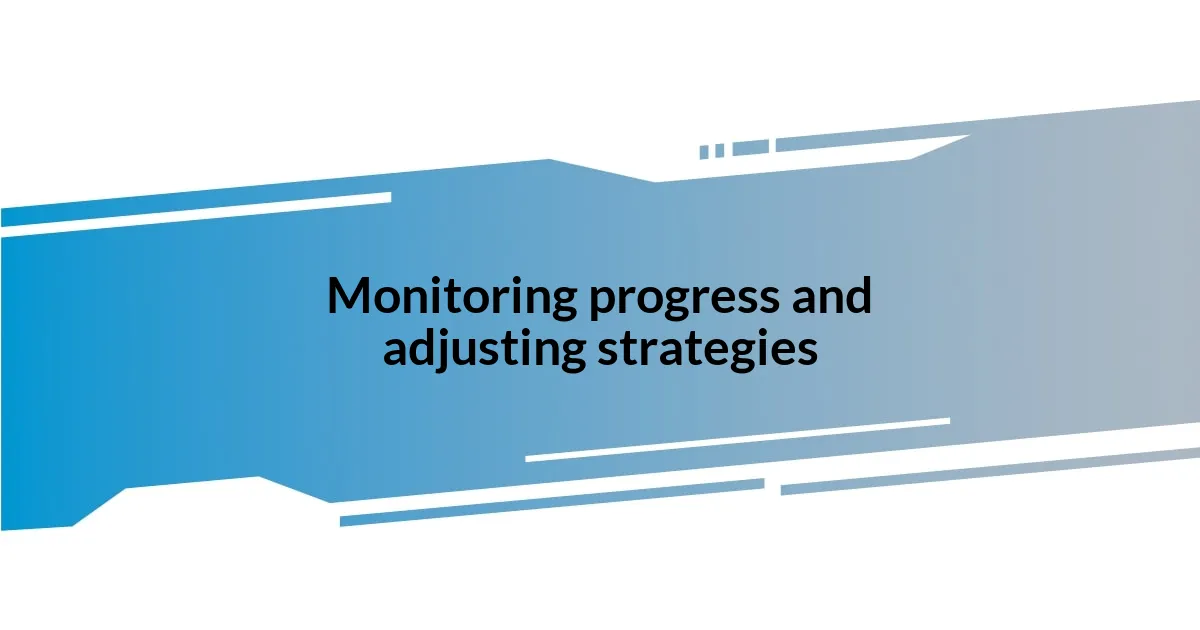
Monitoring progress and adjusting strategies
Monitoring progress in managing sibling rivalry is essential to see what works and what doesn’t. I remember tracking our interactions after we implemented new strategies; some days felt like a breakthrough, while others were fraught with friction. It was during those challenging moments that I realized we needed to be adaptable. When we noticed old habits creeping back, it was time to revisit our approaches with fresh eyes and an open mind.
Adjusting strategies based on our observations became crucial in our journey. I distinctly recall an instance when a particular game we loved turned into a contentious battleground instead of a bonding experience. We decided to step back, assess what drove the conflict, and chose a different game that encouraged teamwork instead. It taught me that flexibility in our methods was just as important as the strategies themselves. Are there moments in your relationships where a simple tweak could foster better connections?
I found that keeping an open dialogue about our feelings played a substantial role in monitoring our progress. After each play session, we would sit together and talk through what went well and what didn’t. I still cherish those discussions; they provided a platform for us to express our frustrations and joys. By voicing our experiences, we learned to navigate our differences more effectively. It’s a reminder that communication, even in small doses, holds the power to bridge gaps and enhance our relationships. How often do we take time to reflect upon our interactions?